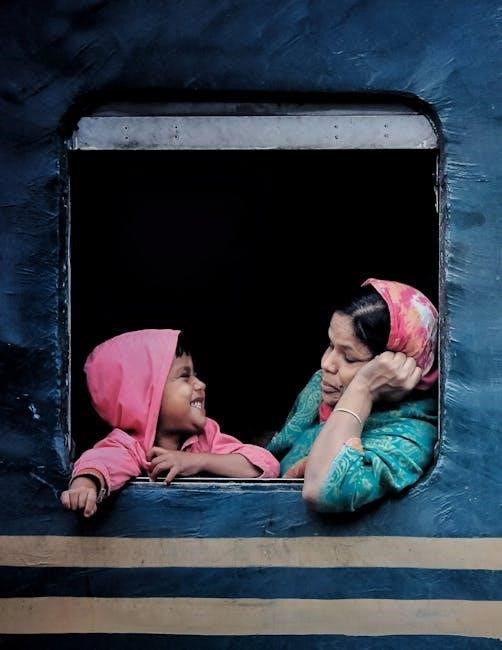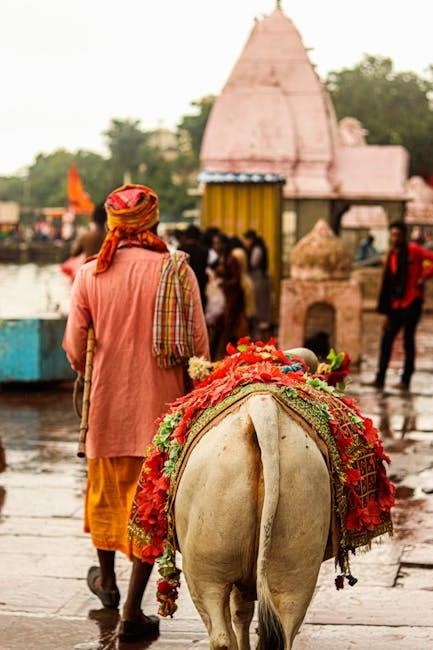The Y Indian Guides program, initiated by the YMCA, focuses on fostering meaningful relationships between fathers and their children through shared activities and cultural experiences.
Overview of the Program
The Y Indian Guides program, offered by the YMCA, is designed to strengthen relationships between fathers and their children through shared experiences. It emphasizes outdoor adventures, cultural activities, and community service, fostering bonding and personal growth. The program encourages parents to become teachers, counselors, and friends to their children, promoting lifelong connections. With a focus on teamwork and mutual respect, it provides a structured environment for families to create meaningful memories. Over time, the program has evolved to include parent-child pairs of all kinds, ensuring inclusivity and relevance in modern times while retaining its core values of unity and understanding.
Historical Background
The Y Indian Guides program was established in 1926 by the YMCA to address the need for stronger father-child relationships. Initially targeting fathers and sons, it aimed to counter stern parenting norms by fostering authentic bonds. The program incorporated Native American imagery and symbols, reflecting the cultural influences of its time. Over the decades, it expanded to include daughters and other parent-child pairings, evolving to meet societal changes. Despite criticism regarding cultural sensitivity, the program remains a cornerstone of the YMCA’s family-focused initiatives, adapting its themes while preserving its mission of nurturing meaningful parent-child connections.
Purpose and Objectives
The primary purpose of the Y Indian Guides is to strengthen parent-child relationships through shared experiences. It aims to create opportunities for parents to act as teachers, counselors, and friends, fostering emotional bonds. The program emphasizes outdoor activities, cultural education, and community involvement to build character and lasting memories. By encouraging quality time and mutual respect, it helps parents guide their children in understanding values and responsibilities. This foundation supports personal growth and lifelong connections, aligning with the YMCA’s broader mission of family and community enrichment. The program adapts to modern values while maintaining its core focus on relationship-building and development.

History of Y Indian Guides
Founded in 1926 by the YMCA, the Y Indian Guides program aimed to strengthen father-child bonds through cultural and outdoor activities, evolving over time to include parent-child participation.
Origins and Development
The Y Indian Guides program originated in 1926 as a YMCA initiative to foster stronger relationships between fathers and sons. Initially designed to counter stern parental roles, it encouraged bonding through shared activities. The program incorporated Native American cultural elements, sparking curiosity and respect. Over time, it expanded to include daughters, becoming more inclusive. Development focused on creating structured yet flexible experiences, blending outdoor adventures with educational content, ensuring lasting memories and personal growth for families. This evolution solidified its place as a cornerstone of YMCA family programs.
Evolution Over Time
Over the decades, the Y Indian Guides program evolved significantly. Originally focused on father-son relationships, it expanded to include daughters, reflecting changing societal values; Cultural elements were reevaluated, leading to a shift from Native American themes to more inclusive adventure-based activities. The YMCA renamed the program to Adventure Guides, broadening its appeal while maintaining core goals. Despite these changes, the essence of fostering parent-child bonds remained central, ensuring the program stayed relevant in modern times. This adaptability has allowed it to continue nurturing families across generations, emphasizing quality time and shared experiences.

Key Milestones and Changes
The Y Indian Guides program originated in 1926, focusing on father-son bonding through cultural and outdoor activities. In the 1950s, it expanded to include daughters with the Y-Indian Princess Program. Over time, criticism of Native American imagery led to a shift away from such themes. The YMCA officially renamed the program to Adventure Guides, embracing a more inclusive approach. Despite these changes, the core mission of fostering parent-child relationships remained unchanged. Personalized medallions, introduced in 1971, became cherished keepsakes, symbolizing the program’s enduring legacy in strengthening family bonds.

Organization and Structure
The YMCA oversees the Y Indian Guides, with local chapters organized into “tribes.” Leadership and governance are structured to foster community and parental involvement effectively.
YMCA’s Role in the Program
The YMCA plays a central role in the Y Indian Guides program by providing organizational support, resources, and a framework for activities. The YMCA ensures that the program aligns with its mission of strengthening family bonds and promoting youth development. It oversees the implementation of the curriculum, trains leaders, and facilitates community engagement. Additionally, the YMCA adapts the program to modern values, ensuring cultural sensitivity and inclusivity. Through its guidance, the YMCA helps create meaningful experiences for parents and children, fostering lifelong relationships and personal growth.
Local Chapters and Tribes
Local chapters of Y Indian Guides are organized into tribes, each with a unique name, often inspired by Native American cultures. These groups provide a sense of identity and belonging for participants. Tribes engage in activities such as camping, cultural events, and community service, fostering teamwork and connection. The program emphasizes unity and mutual support through shared experiences. This structure allows families to build lasting relationships and create cherished memories together, while also learning about diverse traditions and values.
Leadership and Governance
Leadership in Y Indian Guides is shared between parents and YMCA staff, ensuring a structured yet collaborative environment. Volunteer leaders, often parents, guide activities and events, fostering a sense of community. The YMCA provides overarching governance, setting program standards and offering resources. This dual approach ensures the program remains both locally relevant and nationally consistent. Leaders are trained to promote inclusion, safety, and personal growth, creating a supportive framework for families to thrive and build lasting relationships through shared experiences and mutual respect.

Activities and Events
Y Indian Guides offers outdoor adventures, cultural programs, and community service, fostering bonding and creating lifelong memories through shared experiences.
Outdoor Adventures and Camping
The Y Indian Guides program emphasizes outdoor adventures and camping as central activities, fostering father-child bonding through shared experiences in nature. These events encourage teamwork, leadership, and a deeper connection with the environment. Camping trips often include hiking, campfire ceremonies, and storytelling, creating opportunities for families to disconnect from daily distractions and reconnect with each other. The program’s focus on outdoor experiences not only promotes physical activity but also strengthens emotional ties and builds lifelong memories. These adventures are designed to be educational, fun, and culturally enriching, reflecting the program’s commitment to holistic development and family unity.
Cultural and Educational Programs
Cultural and educational programs are integral to the Y Indian Guides, offering a blend of learning and enrichment; These activities often incorporate Native American traditions, such as arts, crafts, and storytelling, to promote cultural awareness. Workshops and events are designed to educate participants about diverse traditions, fostering respect and appreciation for different cultures. Additionally, these programs provide opportunities for personal growth, teaching valuable life skills and values. The combination of cultural immersion and educational content creates a meaningful experience for both parents and children, enhancing their understanding of the world and strengthening their bond through shared learning.
Community Service and Involvement
Community service is a cornerstone of the Y Indian Guides program, fostering a sense of responsibility and compassion. Participants engage in volunteer activities such as park cleanups, food drives, and supporting local charities. These efforts encourage parents and children to work together for the betterment of their communities. By giving back, they learn the value of empathy and teamwork. The program emphasizes the importance of contributing to society, creating a lasting impact and teaching participants the rewards of helping others. This involvement strengthens not only individual growth but also the bond between families and their communities.

Relationship Building
The Y Indian Guides program fosters meaningful relationships between parents and children through shared activities, creating lifelong memories and strengthening bonds.
Father-Child Bonding
The Y Indian Guides program emphasizes father-child bonding through shared experiences like camping and cultural activities, helping dads become teachers, counselors, and friends to their children, fostering authentic connections.
Parent-Child Interaction
The Y Indian Guides program fosters meaningful parent-child interaction through shared outdoor adventures, cultural activities, and educational experiences, helping parents become teachers, counselors, and friends to their children. By encouraging teamwork and mutual respect, the program strengthens family bonds and creates lasting memories. Parents and children participate in events like camping, crafting, and community service, fostering a sense of belonging and unity. The program emphasizes cultural sensitivity, with medallions and costumes symbolizing achievements and heritage, while providing a platform for parents to guide their children in understanding values and traditions, adapting to modern times while preserving its core mission.
Role of Mentors and Guides
Mentors and guides in the Y Indian Guides program play a vital role in fostering personal growth and friendship between parents and children. They organize activities, provide guidance, and create a supportive environment for families to bond. The program transitioned from Native American-themed activities to more inclusive outdoor adventures, reflecting modern values. Guides ensure safety, facilitate learning, and encourage teamwork, helping families build lasting memories and stronger relationships. This structured approach allows mentors to inspire and empower participants, emphasizing the importance of shared experiences and mutual respect in family development.

Cultural and Symbolic Elements
The program traditionally incorporated Native American imagery, medallions, and costumes, symbolizing unity and heritage. However, criticism led to shifts toward more culturally sensitive and inclusive practices over time.
Use of Native American Imagery
The Y Indian Guides program historically utilized Native American imagery, including headdresses, feathers, and tribal names, to create a sense of adventure and cultural connection. This imagery was central to the program’s branding and activities, reflecting an idealized vision of Native American traditions. However, over time, criticism arose regarding cultural appropriation and stereotyping, prompting the YMCA to reevaluate and adapt the program’s symbols to align with modern values of inclusivity and respect.
Symbolism in Medallions and Costumes
Medallions and costumes in the Y Indian Guides program hold deep symbolic meaning, reflecting themes of unity, heritage, and shared experiences. Medallions often feature engravings that commemorate participation and milestones, serving as cherished mementos. Costumes, adorned with feathers and tribal designs, were designed to foster a sense of connection to Native American traditions. These elements aimed to create a sense of identity and belonging among participants, while also celebrating cultural heritage. Over time, the program has evolved to ensure cultural sensitivity, adapting symbols to align with modern values of inclusivity and respect.

Cultural Sensitivity and Criticism
The Y Indian Guides program has faced criticism for its use of Native American imagery and cultural elements. While initially intended to promote cross-cultural understanding, some argue it perpetuates stereotypes. The YMCA has acknowledged these concerns and taken steps to adapt the program, shifting toward more inclusive and culturally sensitive practices. Changes include renaming the program to Adventure Guides and removing culturally inappropriate symbols. These adjustments reflect a broader effort to respect Indigenous cultures while maintaining the program’s core mission of fostering family relationships. The evolution underscores the importance of cultural awareness and sensitivity in community programming.

Legacy and Impact
The Y Indian Guides program has left an enduring legacy, shaping family bonds and fostering personal growth through its evolution into modern Adventure Guides, celebrating its historical significance while remaining relevant today.

Long-Term Effects on Participants
Participants in the Y Indian Guides program often experience lasting benefits, including strengthened family bonds, improved communication, and a deeper understanding of cultural values. Fathers and children develop shared memories through outdoor adventures, fostering trust and mutual respect. The program’s focus on mentorship and leadership helps children build confidence and life skills. Many alumni reflect on the program as a foundational experience that shaped their personal growth and parenting styles. The evolution into Adventure Guides has ensured its relevance, continuing to inspire meaningful connections across generations. Its impact remains a testament to the power of intentional, quality time between parents and children.
Community Influence and Recognition
The Y Indian Guides program has garnered recognition for its positive impact on family relationships and community engagement. By fostering meaningful interactions between parents and children, it has contributed to stronger family units and societal bonds. The program’s emphasis on cultural awareness and shared experiences has made it a valued part of many communities. Over the years, its adaptability to modern values has ensured its relevance, earning it a reputation as a beneficial and enduring program. Its influence is evident in the countless families who credit it with enhancing their relationships and fostering a sense of belonging.
Adaptation to Modern Values
The Y Indian Guides program has evolved to align with contemporary values, shifting from traditional father-son activities to inclusive parent-child participation. This change reflects modern societal shifts toward gender equality and diverse family structures. Cultural sensitivity has also been addressed, moving away from Native American imagery to more neutral themes. The program now emphasizes mutual respect, understanding, and shared growth, ensuring its relevance in today’s world while maintaining its core mission of strengthening family bonds through engaging activities and meaningful interactions.
The Y Indian Guides program has left a lasting impact on families, fostering meaningful relationships and personal growth. Its evolution into modern programs ensures continued relevance and accessibility.
The Y Indian Guides program, established by the YMCA, aimed to strengthen father-child relationships through outdoor activities, cultural experiences, and shared adventures. It emphasized bonding, mutual respect, and personal growth. The program incorporated Native American imagery and symbolism, though it faced criticism for cultural appropriation. Over time, it evolved into the Adventure Guides program, adapting to modern values while maintaining its core mission. Its legacy continues to inspire families, fostering lifelong memories and connections. The program’s impact remains significant,highlighting the importance of quality time and intergenerational relationships.
Future Prospects and Relevance
The Y Indian Guides program continues to evolve, adapting to modern values while maintaining its core mission of fostering family bonds. With its transition to Adventure Guides, it remains relevant by offering diverse activities that cater to contemporary interests. The program’s emphasis on outdoor experiences and cultural sensitivity ensures its appeal in a rapidly changing world. By focusing on inclusivity and adaptability, it continues to play a vital role in strengthening parent-child relationships, making it a timeless and essential program for future generations seeking meaningful connections and shared memories. Its legacy endures as a testament to the power of quality family time.

